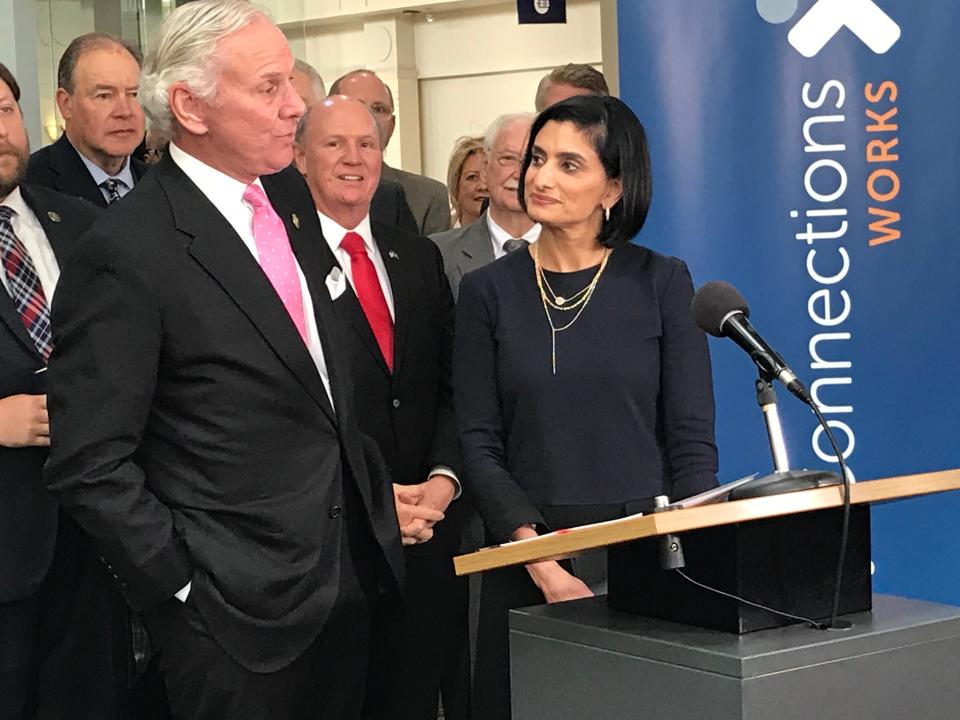Medicaid terminations begin this week in SC. Here's what to know and where to turn.
Scores of Medicaid recipients will begin to lose their insurance next week as states continue to review whether residents still qualify.
The South Carolina Department of Health and Human Services anticipates close to 250-300,000 members will be disenrolled by 2024. That will roll back enrollment numbers from 1.3 million to pre-pandemic levels at just over 1 million.
KFF, a non-partisan health research organization, estimated close to 214,300 Medicaid losses, including over 86,000 children.
Here's what to know as Medicaid terminations begin in South Carolina:
What is Medicaid?
Medicaid is a health assistance program for low-income families and individuals and is designed as a state government and federal government partnership under the Affordable Care Act passed by the Obama administration.
To qualify, children should be under the age of 19 and live in 213% of the federal poverty level. Low-income families should make 67% of the federal poverty level and pregnant women about 199%.
As of Dec. 31 2021, Greenville County had the highest number of children enrolled with 67,021 participants. Meanwhile, Spartanburg County had 49,595 children and 27,990 were enrolled from Anderson County, between the ages 0 and 18 were enrolled in Medicaid, as per data provided by SC DHHS.
The three counties had fewer non-elderly adults under the age of 65 enrolled. Only 12% of the enrollees on average were serviced by Medicaid. Most of the older population was covered by Medicaid in the midlands, as per data collected by Georgetown University Health Policy Institute.
Federal law mandates that a state must first try to renew coverage automatically. They must seek data from sources such as social security information or the Department of Revenue to confirm eligibility.
About 92 million people are enrolled in Medicaid nationwide and South Carolina services 1.3 million. The federal government estimates 15.8 million people will lose Medicaid coverage after states complete the long Medicaid "unwinding" process.
Experts on Medicaid coverage: If you're 'unsure don't ignore it'
Dan Tsai, director of Center for Medicaid and CHIP services, told reporters in April that most residents were at risk of losing coverage due to an "administrative churn."
The state could have outdated addresses and contact information and may not know where to send renewal forms, Tsai said.
SC DHHS Spokesperson Jeff Leieritz said the department has sent texts, emails and renewal forms to urge recipients to log onto their online profiles on Healthy Connections and update their contact information. The department has also partnered with community groups and navigators in county offices to support residents. There is also an online tool that can help members update contact information and upload documents.
Advocates also encourage Medicaid recipients to reach out to Primary Health Care Association and connect with navigators. Residents can also find the closest healthcare center near them to seek assistance or contact SC DHHS at 888-549-0820, Monday-Friday from 8 a.m. to 6 p.m.
"I think the one most important thing message for people is — if you're not sure, don't ignore it," SC Appleseed Director Sue Berkowitz said. "Fill out the paperwork, fill it out for everybody that's in your household who may be eligible, who's getting Medicaid now."
What happens if you're disenrolled from Medicaid?
Advocates said residents should appeal for a fair hearing if they feel that they were eligible and were still disenrolled.
They said many will still remain eligible for ACA's federal marketplace coverage, which could still be a free or cheaper option due to subsidies.
Marketplace coverage begins at the 100% federal poverty threshold. However, those who make less than 100% of the poverty level and more than 67% will still fall in a "coverage gap," where they may not qualify for any type of subsidized coverage.
"It's a hard thing to come to terms with but that is part of the case where there is not a Medicaid expansion," Tsai said.

Here's how we got here
The Medicaid renewal process is not new, though it has been on a hiatus for the past three years.
When the pandemic began in March 2020, the federal government passed the Families First Act. They sent additional Medicaid funding to help states ride out the public health emergency on the condition that states stop the disenrolling people. During this time, several first-time Medicaid users became beneficiaries after they lost their jobs and the enrollment numbers climbed.
Then, in Dec. 2022, the federal government rolled back emergency regulations and states were free to resume eligibility reviews.
About 92 million people are enrolled in Medicaid around the U.S. and South Carolina services 1.3 million. The federal government estimates 15.8 million people will lose Medicaid coverage after states are done the long Medicaid "unwinding" process.
Devyani Chhetri covers SC politics for the Greenville News. Reach her via email at dchhetri@gannett.com.
This article originally appeared on Greenville News: Medicaid terminations in SC. What to know about healthcare coverage

